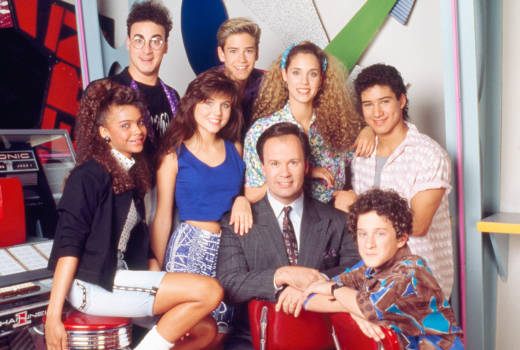With that in mind, and in order to pledge allegiance in good conscience, I decided to take the plunge and finally watch the damn thing.
Saved By The Bell was on the air for five seasons between 1989 and 1993, which seems like a relatively short run, given how much people still talk about it. (Beverly Hills 90210, by comparison, ran for 10.) I initially assumed that was part of its allure -- it didn't wear out its welcome. Then I discovered Saved By The Bell: The College Years (featuring only half the original cast), as well as Saved By The Bell: The New Class (featuring only Screech), and two spin-off movies, (Wedding in Las Vegas and Hawaiian Style). Every possible angle was milked from this thing.
Not wishing to overdose on technicolor shirts and tapered stonewashed jeans, I limited my views to the first episode of all five original seasons. The first thing I noticed is that this is a show in which almost nothing happens. Bayside is a world that revolves almost entirely around dancing. All anyone does is learn dances, plan dances, and hang out in places where people go to dance.
What few plot points occur are often recycled later on. For example, the first episodes of Season 2 and 3 are both concerned with whether Kelly Kapowski will go to a dance with Zack Morris or AC Slater. In Season 1, Zack lies about his age to go out with an older girl; in Season 5, a freshman does the same thing to Lisa Turtle. In Season 5, Zack and Slater compete for the affections of a new girl in school -- just like they used to with Kelly.
In Saved By The Bell, the worst thing that can happen to you is spraining your ankle and not being able to dance, or not being able to go to the dance because your dad just lost his job, or -- poor, beautiful Jessie Spano -- being too tall to dance with boys unselfconsciously. Wikipedia tells me that the show also, at some point, covered “drug use, driving under the influence, homelessness, remarriage, death, women’s rights and environmental issues.” I saw no evidence of any of this in the episodes I watched (unless you count Jessie occasionally calling someone sexist).
Saved By The Bell makes Glee look like Kids.
At Bayside High, adolescence is easy, bullying doesn't exist, teens kiss with their mouths closed, racism isn't a thing, and parents and teachers are always loving and supportive. The dynamics are totally unrealistic. Screech is a nerd who gets to play in the same band as the cool kids. Jessie and Lisa are constantly passed over because the boys all want Kelly, yet no one ever gets jealous. Zack is a teenage boy that gets dumped for a college kid and responds by asking his cheating girlfriend for "one last dance."
Saved By The Bell is unabashedly, self-consciously feel-good. It represents an ultra-idealized version of a very specific period of time, in much the same way that Happy Days does. More importantly, Saved By The Bell represents the country that America, at its core, wants to be, and has always wanted to be. These are the teenagers America likes to think it produces the most: good-looking, fun-loving, wise-cracking, unsullied.
So, do I feel more American having now familiarized myself with Saved By The Bell? Actually, I do. I finally understand jokes that have eluded me for over a decade. I finally know where Mario Lopez emerged from. And knowing where Elizabeth Berkley started is going to make Showgirls even weirder next time I watch it. In the end, Saved By The Bell is a fantasy about how good America is, and wants to be. And, at a time where the country is divided like never before, that's a nice, optimistic reminder of why I moved here in the first place.


